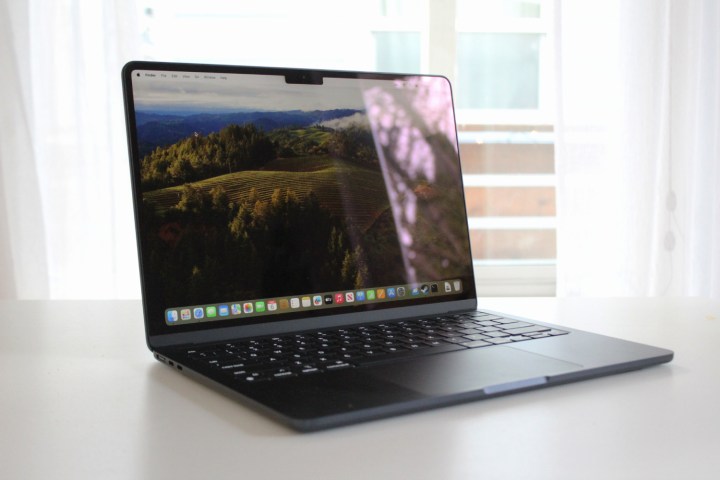
MacBooks have held a dominant position in the laptop world for the past few years. Though there have been meaningful rivals from the Windows side of the aisle, the MacBook Air and MacBook Pro still feel like they hold an unshakeable lead at the moment.
But according to the latest reports, the most serious challenger to the MacBook’s reign won’t come from Windows — it’ll come from within Apple in the form of some very advanced new iPads.
What’s a computer?

It’s long been something of a meme that iPads will one day replace your MacBook, and Apple even acknowledged this idea with its own “what’s a computer?” ad back in 2016. The predictions have never come to pass, of course, but now it seems like there’s a real chance that iPads could finally start stealing some market share from Apple’s best MacBooks.
Why is that? It all comes down to a prediction made in Bloomberg reporter Mark Gurman’s latest Power On newsletter. In the report, Gurman explains that Apple is planning some significant iPad Pro upgrades for early May that could be “some of the biggest changes in the product’s history.”
The key point here in relation to the MacBook? Gurman believes that one of the major iPad updates is an OLED display, which will likely be limited to the iPad Pro (at least for now). According to Gurman, the tech “apparently looks amazing on such large displays,” and given how incredible the latest iPhone’s OLED screen is, I can believe that.
You know what doesn’t have an OLED display? The MacBook Pro. In fact, it’s still stuck on IPS and mini-LED technology, putting the iPad Pro and Apple’s top-end laptop on a collision course. Apple already offers a keyboard and trackpad case for the iPad Pro (the Magic Keyboard case), and if you were to pair that with an OLED iPad, you’d get a laptop-like experience that could be a major threat to the MacBook. For many people, that might be enough to tempt them away from Apple’s laptops and toward its tablets.
More than meets the eye

There are more reasons why the iPad Pro could end up challenging the MacBook beyond its mooted visual improvements. For one thing, Apple is outfitting its iPads with some of the same Apple Silicon chips as you can find in its laptops. There’s no longer an enormous performance lag between the two devices, making the iPad an extremely capable device for all manner of users. In particular, the latest update is reported to bring the M3 on board, which will add a serious amount of power to the GPU, as we’ve seen in the MacBook Air.
Then there’s the price. That extra OLED goodness will undoubtedly raise the cost of an iPad, possibly significantly beyond the $799 starting price of the current iPad Pro. Right now, the iPad’s lower cost is one thing that helps to differentiate it from the MacBook. But if these products’ prices become much closer, there are probably going to be a lot of people who look at them and decide that the iPad’s increased portability and flexibility wins out for them.
Gurman touched on another related product that could be due an imminent upgrade: the Magic Keyboard case that I mentioned earlier. He didn’t shed much light on how exactly this accessory will be changing, but if it were to offer some compelling new features, that’s potentially another strike against the MacBook.
All in all, the upcoming iPad changes could make the Pro model a compelling alternative to the MacBook for some people, particularly those who are looking for an entry-level or midrange laptop. Yet despite all that, we probably shouldn’t get too far ahead of ourselves in our predictions of MacBook doom.
Inching closer together

People have been forecasting that the iPad will cannibalize the MacBook for years, and yet it’s never actually come to pass. Each device has its own fans and its own niche, and Apple clearly doesn’t feel that it’s time to drop one in favor of the other.
Part of the reason is that for a lot of people, a tablet probably cannot replace a laptop, no matter what its abilities are on paper. Unlike the MacBook Pro, the iPad only has one USB-C port and no HDMI slot, limiting its options for expansion. It doesn’t have a large 16-inch display option, and while it uses an Apple Silicon chip, you can’t equip it with the much more powerful Pro or Max variants.
In addition, the Mac has been undergoing a gaming renaissance recently, with some incredible performance figures and a healthy choice of genuine AAA titles available to play. The gaming selection on the iPad is much more limited, which will continue to hold it back from being a proper games machine even with its improved OLED display and upgraded Magic Keyboard.
Ultimately, Apple needs to be very careful not to cannibalize its own products here. With an OLED screen, a higher price, and a better keyboard around the corner, the iPad is inching ever closer to the MacBook. While I don’t think this is going to prompt a mass exodus of laptop users who end up switching to Apple’s tablet, for some people, a MacBook probably won’t be necessary anymore. Apple will be hoping it can keep sales of both devices as high as it can without one making the other irrelevant.
I’ll still be looking to get a MacBook when it’s time for me to upgrade. But I can’t deny I’ll be keeping one eye firmly on the iPad Pro.
Editors' Recommendations
- 6 things we expect from WWDC 2024: iOS 18, AI, and more
- Some updates coming to macOS 15 aren’t just about AI
- Why you should buy a Mac mini instead of a MacBook Air
- I ask again: Will Apple ever merge the Mac and iPad?
- The new iPad Pro would be perfect, if only it were a Mac



